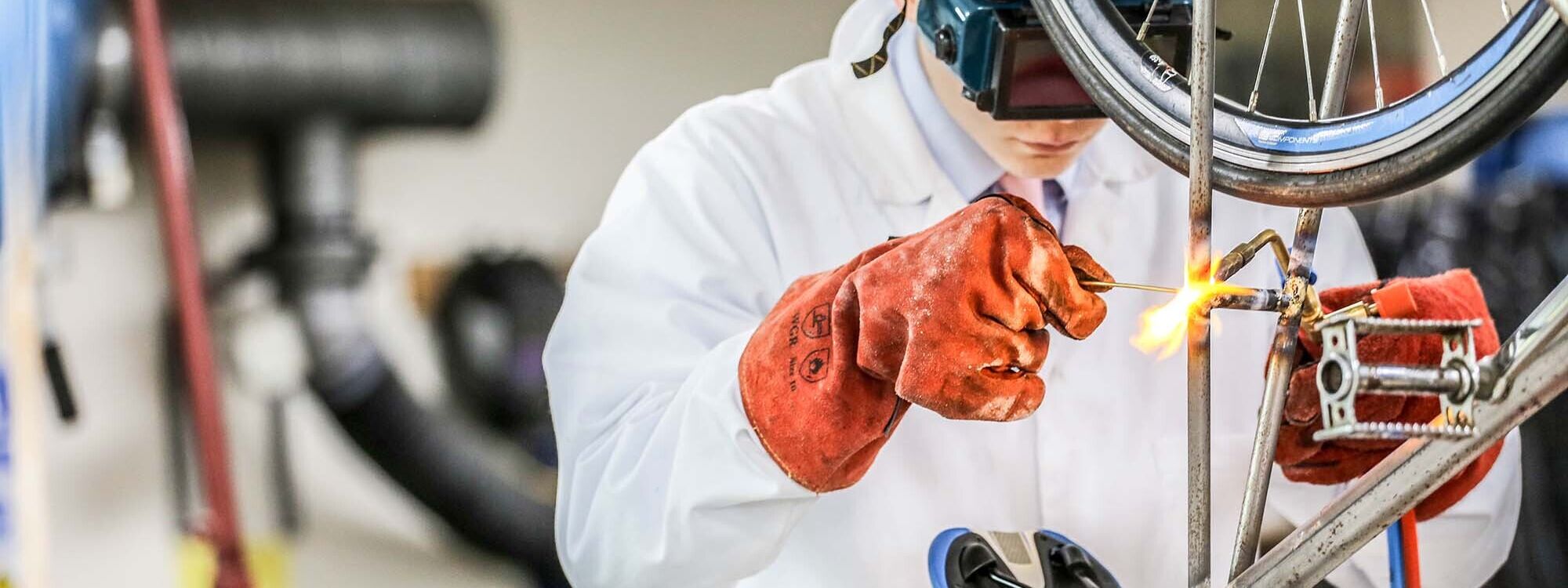Design and Technology
An A Level in Design and Technology offers students the opportunity to develop a wide range of both academic and practical skills in a creative and challenging environment. We aim to foster independence while teaching the principles required to go on to study a variety of higher education courses, including Product Design, Engineering, Architecture, Fashion, Costume Design or a foundation course.
The department at King Edwards is a modern well resourced centre which comprises; two multi material workshops, a dedicated textiles room, an ITC suite and staffing and materials preparation rooms. The Department is well equipped with a wide variety of materials, machinery and processes available. There is full technical support from the department technician for both staff and students.
At A level, students will study the OCR Design and Technology Product Design course, this strengthens learners’ critical thinking and problem solving skills within a creative environment, enabling them to develop and make prototypes/products that solve real world problems, considering their own and others’ needs, wants, aspirations and values. The A Level qualification requires learners to identify market needs and opportunities for new products, initiate and develop design solutions and make and test prototypes/products. Learners will acquire subject knowledge in design and technology, including how a product can be developed through the stages of prototyping, realisation and commercial manufacture.
This qualification will excite and engage learners with contemporary topics covering the breadth of this dynamic and evolving subject. It will create empathetic learners who have the ability to confidently critique products, situations and society in every walk of their lives now and in the future.
Skills Required
Students will be expected to exercise initiative, imagination and resourcefulness in both design and manufacture. The A Level course is available to pupils who have studied a GCSE in Design and Technology, regardless of the individual specialism (resistant materials, textiles, graphics products or any other course). Students who have not studied the subject at GCSE are not excluded; however, they are subject to interview with the Head of the Design and Technology Department.
Topics Covered
Over the two year course, students will study the following:
- Chapter 1 - Identifying requirements: Use of colour in design, stakeholders, the iterative design process, DFM design for manufacture
- Chapter 2 - Learning from existing products: Ergonomics, inclusive design and anthropometrics, the work of past and present designers
- Chapter 3 - Wider issues: LCA life cycle assessments, end of life disposal, environmental impact of products.
- Chapter 4 - Design thinking: Prototypes and modelling
- Chapter 5 - Materials and components: Metals, plastics and timbers, fabrics, smart and modern materials
- Chapter 6 - Technical understanding: Understanding design systems
- Chapter 7 - Manufacturing processes
- Chapter 8 - Viability of design solutions
- Chapter 9 - Health and Safety: legislation for designers
Methods of Assessment
Lower Sixth
Assessment in the Lower Sixth is through ongoing practical and written assessments. Students are given the chance to complete a reduced design and make project. This project and the end of year examination will form the main evidence for the production of UCAS grades.
Upper Sixth
Assessment in the Upper Sixth consists of the NEA (Non Examined Assessment), which is 50% of the final grade. Students have a free choice on both the problem and material area. Additionally, students sit two final written papers to produce the other 50% of the final grade.
Meet the staff
If you have a specific enquiry for the Design & Technology Department, email D&T@kes.hants.sch.uk
| Mrs. A.M.L. Blow BSc |
Head of Design & Technology |
| Mrs. A. Herbert BA |
Design & Technology |
| Mrs. S. Peterson BA |
Design & Technology |




